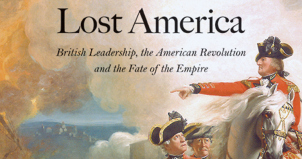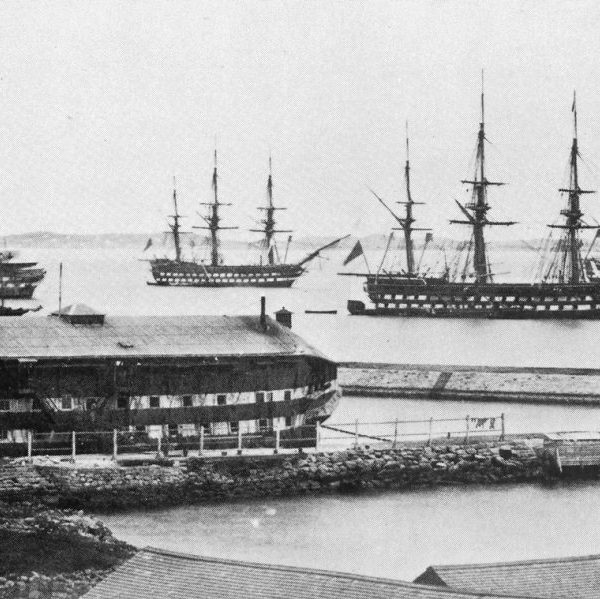The British Government Responds to News of the Battle of Yorktown
Now available in North America, Andrew Jackson O’Shaughnessy‘s unique account of the American Revolution in The Men Who Lost America: British Leadership, the American Revolution, and the Fate of the Empire, told from the perspectives of King George III, Lord North, General Burgoyne, and other British leaders, brings to light the real reasons behind the British Empire’s stunning and unexpected loss. Here, the author recounts the events of November 1781 and how the moment of British defeat was received by the aristocracy at home.
Andrew Jackson O’Shaughnessy—
Throughout much of November 1781, there was still no certain news in London of the outcome of the Battle of Yorktown. As accounts of the strength of the enemy positions arrived, the mood of the government grew more anxious each day. George III and Lord George Germain, the cabinet minister most responsible for the conduct of the war, had been so confident of victory that the draft of the King’s speech for the state opening of Parliament predicted British success in America. Germain, in particular, was aware that the outcome of the battle would determine the fate of the war and probably the future of the government of Lord North. He began to confide uneasiness on the subject to his friends. At noon on Sunday, November 25, 1781, Germain was at his private residence next to Carlton House in Pall Mall, in London, when he received official confirmation of the news that he had been dreading. Saying nothing to a guest, he immediately ordered his hackney-coach to be driven to the residence of one of the other Secretaries of State, Lord Stormont in Portland Place. After imparting the “disastrous information” of the surrender of Lord Cornwallis, Germain and Stormont instantly took a carriage to see the Lord Chancellor, Lord Thurlow in Great Ormond Street. After a short conference, they collectively decided to summon their nerve and go in person to the Prime Minister, Lord North.
 Between one and two o’clock in the afternoon, the three cabinet ministers arrived at the official residence of the Prime Minister in Downing Street. Although he had long despaired of the war and had many times attempted to resign, Lord North reacted to the news in a state of shock. Germain described how the Prime Minister responded, as if he had been shot, “As he would have taken a ball in his breast.” Pacing up and down his rooms for several minutes, North suddenly opened his arms exclaiming wildly, “O God! It is all over!” North repeated the words many times in a state of consternation and distress. After North had calmed down, the ministers discussed whether to postpone the state opening of Parliament, which was due to occur in less than forty-eight hours. With many members having already arrived in the capital and others on their way, they decided against a change. They then spent several hours rewriting the King’s speech, which was to be delivered from the throne in the House of Lords. The speech had originally predicted victory but was altered to make a token reference to the events at Yorktown. Germain then sent word of the news of the “melancholy termination of Lord Cornwallis’s expedition” to his Majesty King George III, who was at Kew Palace on the outskirts of London. Germain then returned to his office in Whitehall, where he found additional confirmation of Cornwallis’s defeat at Yorktown in a French account.
Between one and two o’clock in the afternoon, the three cabinet ministers arrived at the official residence of the Prime Minister in Downing Street. Although he had long despaired of the war and had many times attempted to resign, Lord North reacted to the news in a state of shock. Germain described how the Prime Minister responded, as if he had been shot, “As he would have taken a ball in his breast.” Pacing up and down his rooms for several minutes, North suddenly opened his arms exclaiming wildly, “O God! It is all over!” North repeated the words many times in a state of consternation and distress. After North had calmed down, the ministers discussed whether to postpone the state opening of Parliament, which was due to occur in less than forty-eight hours. With many members having already arrived in the capital and others on their way, they decided against a change. They then spent several hours rewriting the King’s speech, which was to be delivered from the throne in the House of Lords. The speech had originally predicted victory but was altered to make a token reference to the events at Yorktown. Germain then sent word of the news of the “melancholy termination of Lord Cornwallis’s expedition” to his Majesty King George III, who was at Kew Palace on the outskirts of London. Germain then returned to his office in Whitehall, where he found additional confirmation of Cornwallis’s defeat at Yorktown in a French account.
As a supporter of the government and a member of Parliament, the memoirist Nathaniel Wraxall attended a dinner party with nine other guests that evening at Lord George Germain’s home in Pall Mall. Apart from Thomas de Grey, Lord Walsingham, who had formerly served as an undersecretary to Germain, the guests were unaware of the fateful news that Germain had received from America. Before the dinner was finished, one of the servants delivered an urgent message from the King. Looking and directing his remarks exclusively at Lord Walsingham, Germain said: “The King writes just as he always does, except that I observe he has omitted to mark the hour and the minute of his writing.” George III always wrote the precise time to the last minute in his letters. Although Germain’s remark was calculated to awaken interest around the table, the guests made no comment and repressed their curiosity, owing to the presence of his three daughters.
The moment that his daughters left the room, Germain told the dinner party guests of his just having heard that the Comte de Maurepas, the First Minister of France, was “lying at the point of death.” Wraxall replied that if he were the First Minister of France, it would grieve him to die without knowing the outcome of the great contest between England and America. Germain responded that the French minister had survived long enough to witness the result. Wraxall thought Germain was alluding to an indecisive naval action off the Chesapeake Capes, between the fleets of Britain and France. Wraxall then explained he had meant to say that it was a shame that the dying French minister would never know the final result of the war in Virginia. Germain repeated that the French minister had survived to witness it completely: “The army has surrendered, and you may peruse the particulars of the capitulation in that paper.” Without any visible emotion, Germain removed the paper from his pocket and gave it to Wraxall, who read it aloud while the other guests sat in stunned silence. The news cast a gloom over the rest of the evening as the party pondered the political fallout.
The guests really wanted to know how George III reacted to the news of Yorktown. They were well aware that the King would find it especially painful, as it was the most humiliating event of his reign. George III had become the driving force behind the war and had threatened to abdicate rather than accept defeat. Germain gratified the wishes of his guests by reading aloud the letter from the King, while remarking that the letter was a testimony to the King’s fortitude, firmness, and consistency of character. Wraxall recalled thirty years later that the lapse of time had not erased the deep impression that the reading of the King’s letter had made on his memory that evening. It contained not a word of despondency or despair, while the handwriting indicated complete composure of mind. The King wrote defiantly that the news did not make the smallest change in his views and that he was ready to continue the war. He would not admit defeat.
Andrew Jackson O’Shaughnessy is Saunders Director of the Robert H. Smith International Center for Jefferson Studies, Monticello, and professor of history, University of Virginia. He lives in Charlottesville, VA. The Men Who Lost America: British Leadership, the American Revolution, and the Fate of the Empire, is available worldwide from Yale University Press, excluding the United Kingdom and British Commonwealth and excepting Canada.




